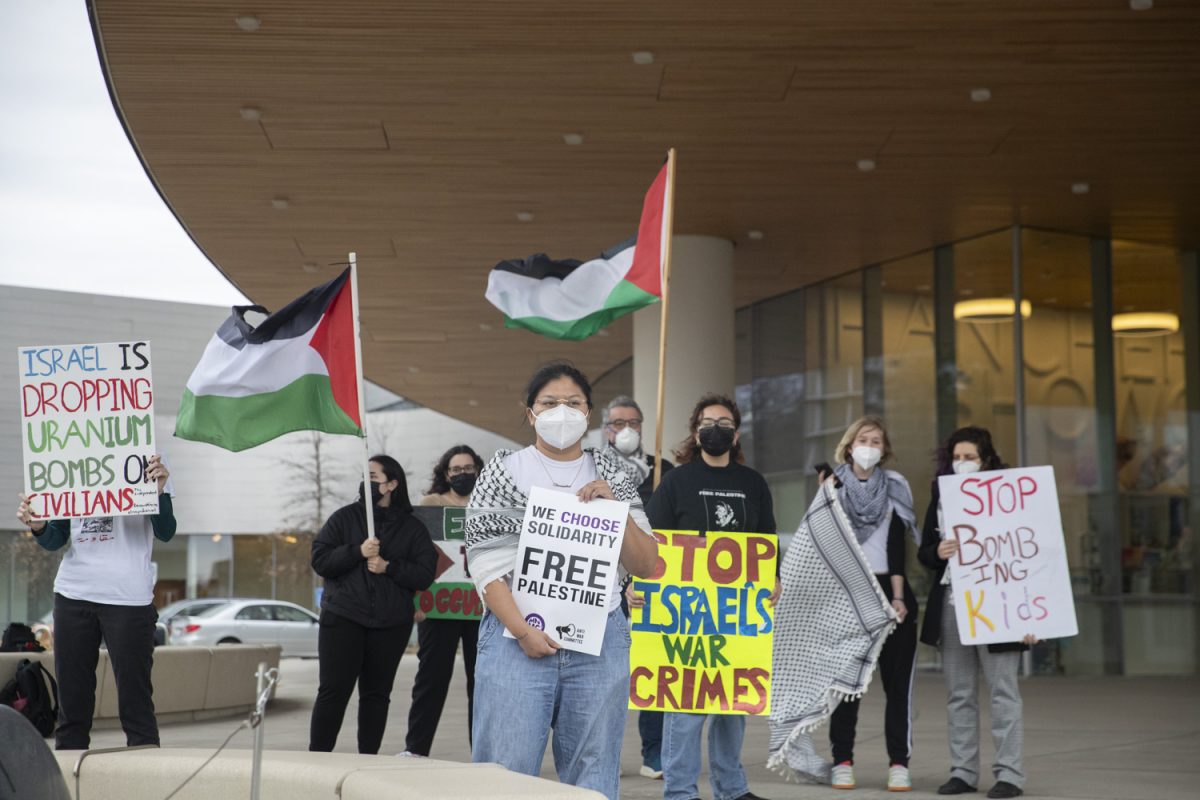About 20 protesters gathered outside Hancher Auditorium Thursday evening to oppose a performance by the Jerusalem Quartet, an Israeli ensemble, denouncing it as cultural complicity in the ongoing violence in Gaza.
Many clad in keffiyehs — a checkered scarf emblematic of Palestinian solidarity — and waving Palestinian flags, demonstrators held signs condemning Israel’s actions and chanted, “Artists take a side, no excuse for genocide.”
With a sign reading, “Israel is dropping uranium bombs on civilians,” participant Nick Legue shared how the destruction in Gaza hits close to home.
“This protest isn’t about one individual, it’s about the tens of thousands of Palestinian Christians and Muslims facing genocide,” Legue said. “It’s deeply personal for me because my church was bombed and several parishioners killed.”
Legue said he feels it is shameful that Hancher Auditorium showcased the Jerusalem Quartet, an Israeli four-person string ensemble, despite calls from the advocacy group Iowans for Palestine to cancel the performance.
Andre Perry, executive director of Hancher Auditorium, was not available for comment. A staff member told The Daily Iowan that approximately 160-180 tickets were sold.
Tristan Bracewell, a member of Iowans for Palestine, said he was disappointed but ultimately not surprised that Hancher Auditorium did not cancel.
“We’re here protesting the UI partnering with cultural ambassadors from Israel specifically engaging in art-washing of Israel’s crimes,” Bracewell said, referring to the use of art to distract from or legitimize state violence and human rights abuses.
While the Jerusalem Quartet has been described by critics as cultural ambassadors for the Israeli government, the ensemble stated in 2010 that it operates independently and does not officially represent the state.
In a letter to the editor in Little Village magazine, Jaime Nevins of Jewish Voice for Peace of Eastern Iowa described the Jerusalem Quartet as cultural ambassadors for the Israeli government, used to obscure what they called the genocide of Palestinians.
“How can you separate the art from the artists that are trained, financially supported, endorsed and honored by a genocidal government,” Nevins wrote.
Palestinian-American professor Deemah Totah, who was among the protesters, expressed disappointment in the decision to host the group, noting that Hancher Auditorium has not featured any Palestinian artists in at least the past two years.
“Ongoing violence for the last 50 plus years and Israel’s siege on Gaza since 2006 is the reason that Palestinian artists in Gaza are unable to leave and tour internationally. They are denied permits by Israel,” Totah said. “In the latest genocidal campaign, Israel has destroyed all institutions of higher education in Gaza.”
Totah said she was deeply disappointed that Hancher Auditorium chose to spend its budget on booking the Jerusalem Quartet and on increasing the presence of University of Iowa Police Department officers in response to the protest.
Before the concert began at 6 p.m., a UIPD officer approached the protesters to acknowledge their right to assemble and communicate the UI’s protest guidelines, which include not blocking entrances or exits and not following attendees as they enter or leave the venue. A handful of UI Campus Safety officers were stationed in the lobby.
Among those attending the concert was Tracy Finkelshteyn, a professor at Grinnell College, who brought a group of approximately 10 of her students. Regarding the protest outside, Finkelshteyn called the violence in Gaza a “complicated situation.”
“There’s atrocities happening on both sides,” Finkelshteyn said.
Daniel Stewart, a student in Finkelshteyn’s group, said he believes Palestinian liberation is important and has organized pro-Palestine protests at Grinnell College.
“I think there’s an aspect of nuance with artistic expression,” Stewart said. “I don’t think the Jerusalem Quartet is the most guilty.”
Iowa City City Council member Oliver Weilein, who was among the protestors, acknowledged the individual quartet members are likely talented musicians but said he believes the ensemble as a whole exists to promote a positive image of Israel as a nation.
“It’s clear that the Jerusalem Quartet is part of a larger, intentional effort to paint the state of Israel as a good guy,” Weilein said. “It’s within the goal of the apartheid government to keep its image positive.”
Weilein said Hancher Auditorium deciding to host the quartet shows a lack of willingness to “meet the moment” as Israel carries out military actions that Weilein believes are genocidal.
“They would rather play it safe — not brave enough to take a stand,” Weilein said of Hancher Auditorium staff. “Either that or they just don’t care.”
The group of protesters dispersed without incident after the first concert began at 6 p.m., with some saying they planned to return ahead of the second performance at 8 p.m. Attendees entering Hancher for the concert largely passed by quietly without engaging with the demonstration.



